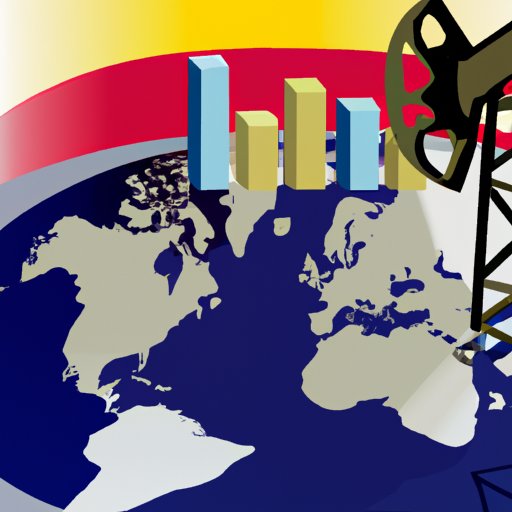Introduction
Oil is one of the most important resources in the world today, and it plays a major role in global economies. But who has the most oil? This question is not an easy one to answer, as there are many factors that contribute to a country’s oil production and reserves. In this article, we will explore the top oil-producing countries and reserves, examine the biggest oil producers in the world, investigate the economic impact of oil production, and analyze the geopolitics of oil.
Exploration of the Top Oil-Producing Countries
According to the US Energy Information Administration, the top ten oil-producing countries in 2019 were Saudi Arabia, the United States, Russia, Iraq, Iran, Canada, UAE, China, Brazil, and Kuwait. These countries produce more than 65 percent of the world’s oil supply.
The factors that contribute to each country’s oil production vary. For example, Saudi Arabia is the world’s largest exporter of crude oil and produces about 12 million barrels per day. The United States is the world’s second-largest producer of oil, with about 11 million barrels per day. Russia is the third largest producer, with 10 million barrels per day. Iraq, Iran, and Canada are also major producers, but their oil production is limited due to political unrest or sanctions.
Comparison of the World’s Largest Oil Reserves
Oil reserves refer to the amount of oil that is recoverable from underground sources. According to BP’s Statistical Review of World Energy 2019, the five countries with the largest oil reserves are Venezuela, Saudi Arabia, Canada, Iran, and Iraq. Together, these countries hold approximately 55 percent of the world’s total oil reserves.
Venezuela has the largest oil reserves in the world, with more than 300 billion barrels of recoverable oil. Saudi Arabia is second, with more than 266 billion barrels. Canada is third, with 177 billion barrels, followed by Iran and Iraq with 156 billion and 144 billion barrels, respectively.
These countries use their oil reserves for a variety of purposes, including domestic energy needs, export revenue, and geopolitical leverage. For instance, Venezuela exports oil to the United States, while Saudi Arabia uses its oil reserves to maintain its influence in the Middle East.

Examining the Biggest Oil Producers in the World
In addition to the top oil-producing countries, some of the world’s biggest producers are China, Mexico, and Nigeria. China is the world’s largest importer of oil, and produces about 5 million barrels per day. Mexico is the second-largest producer in Latin America, producing 4 million barrels per day. Nigeria is Africa’s largest producer, producing 2.8 million barrels per day.
These countries have different strategies for maximizing oil production. For example, China has invested heavily in new technologies and infrastructure to increase efficiency and reduce costs. Mexico has implemented reforms to attract foreign investment and spur growth in its oil industry. And Nigeria is focusing on diversifying its oil production to reduce its reliance on crude oil.

Investigating the Economic Impact of Oil Production
Oil production has a significant impact on global economics. Oil prices are closely linked to economic growth, as higher oil prices tend to slow economic activity. At the same time, oil prices can be volatile, as they are affected by a variety of factors including supply and demand, geopolitics, and market speculation.
Oil prices also affect different markets in different ways. For example, high oil prices can be beneficial for oil-producing countries, as it increases their revenues and provides an incentive for further investment in oil production. On the other hand, high oil prices can be detrimental for oil-importing countries, as they must pay more for imported oil.

A Look at the Geopolitics of Oil
The geopolitics of oil is complex and ever-changing. Oil production is often used as a tool of diplomacy, as governments use their control of oil reserves to gain leverage over other countries. For instance, OPEC (the Organization of the Petroleum Exporting Countries) is a powerful organization that sets production quotas for its member countries in order to regulate global oil supplies.
Oil production can also be a source of conflict. Many countries have fought over access to oil reserves, and oil-producing countries have been known to use their resources to exert political and economic influence. As such, the geopolitics of oil is an important factor in international relations.
Analyzing the Role of Oil in Global Markets
Oil is a major part of global markets, and it affects many different industries. Oil is used to produce fuels, plastics, chemicals, and other products. It is also an important commodity for investors, as it can be traded on the stock market and used to hedge against inflation.
Investing in oil can be both rewarding and risky. On the one hand, oil prices are highly volatile and can swing wildly in response to events such as natural disasters or political upheavals. On the other hand, oil prices can also be quite lucrative, as they tend to rise over the long term.
Conclusion
In conclusion, it is clear that oil plays a major role in global economics and geopolitics. The top oil-producing countries and reserves are located in different parts of the world, and each has its own unique strategies for maximizing oil production. Additionally, the economic impact of oil production and the geopolitics of oil are important factors to consider when examining the role of oil in global markets.
Overall, this article has explored who has the most oil and how it impacts the global economy. We have discussed the top oil-producing countries and reserves, examined the biggest oil producers in the world, investigated the economic impact of oil production, and analyzed the geopolitics of oil. By understanding these topics, we can gain insight into the complexities of the global oil market.


